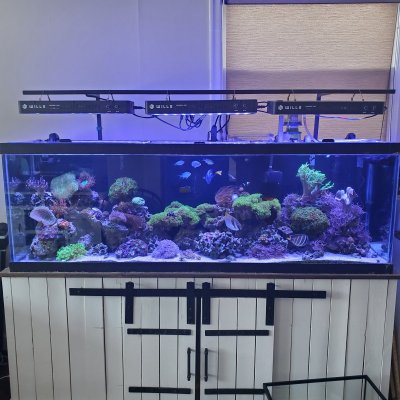Hello everyone!
So I've posted a couple times and have gotten fantastic advice from this group so far, thank you all!
My question today is about a move I will be doing April 6th. So just bought our first house and are moving. We decided to build a new 120 gallon tank that fit our space better and am building it peninsula style. We are changing from the current 120 6' long sumpless mixed reef running a canister filter and hob skimmer and refugium to a 4' x 2' 120 gallon peninsula room divider tank with 30 gallon sump, 10 gallon refugium and 10 gallon ATO.
My question is in regards to the move itself, I have read mixed thoughts on doing 100% new water on the new system and 50/50. Was wanting to get your opinions and why or why not to do a 100% new water.
My current setup has been running for a year now and is doing well, nitrates and phos are high at 25 and 1 respectively and it's been a constant battle with running it without a sump and just a small hob fuge hence the upgrade. I did a large water change the other day and have yet to retest (downfalls of working nights shifts as a paramedic). So anyways with the new tank I was thinking of doing 100% new water, using all the same rock I currently have of course and rinsing the old sand and adding some new sand to do a DSB on the new tank. Splitting my current sand between the new fuge, new DT and a friend's new setup to help her get a cycle started as well as some of my live rock as I have too much to fit into the new tank. Obviously keeping some emergency fritz bacteria and ammonia and nitrate lock on hand.
The plan is to move the rock and sand one day and get it set up and then the fish and inverts the next day or two. What are your thoughts for those of you who have done tank moves before.
Pic is of my current tank taken just now.


So I've posted a couple times and have gotten fantastic advice from this group so far, thank you all!
My question today is about a move I will be doing April 6th. So just bought our first house and are moving. We decided to build a new 120 gallon tank that fit our space better and am building it peninsula style. We are changing from the current 120 6' long sumpless mixed reef running a canister filter and hob skimmer and refugium to a 4' x 2' 120 gallon peninsula room divider tank with 30 gallon sump, 10 gallon refugium and 10 gallon ATO.
My question is in regards to the move itself, I have read mixed thoughts on doing 100% new water on the new system and 50/50. Was wanting to get your opinions and why or why not to do a 100% new water.
My current setup has been running for a year now and is doing well, nitrates and phos are high at 25 and 1 respectively and it's been a constant battle with running it without a sump and just a small hob fuge hence the upgrade. I did a large water change the other day and have yet to retest (downfalls of working nights shifts as a paramedic). So anyways with the new tank I was thinking of doing 100% new water, using all the same rock I currently have of course and rinsing the old sand and adding some new sand to do a DSB on the new tank. Splitting my current sand between the new fuge, new DT and a friend's new setup to help her get a cycle started as well as some of my live rock as I have too much to fit into the new tank. Obviously keeping some emergency fritz bacteria and ammonia and nitrate lock on hand.
The plan is to move the rock and sand one day and get it set up and then the fish and inverts the next day or two. What are your thoughts for those of you who have done tank moves before.
Pic is of my current tank taken just now.


















